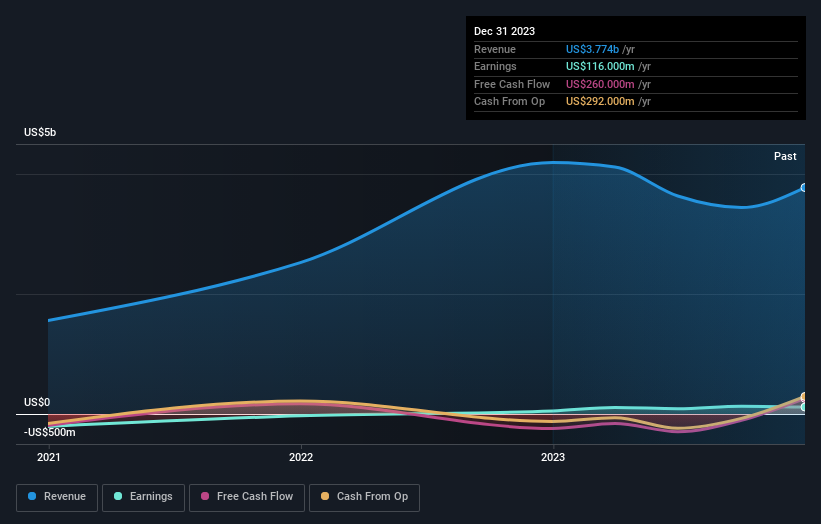- Israel
- /
- Oil and Gas
- /
- TASE:ARF
Institutional investors in Ashdod Refinery Ltd (TLV:ARF) must be dismayed after prices dropped by 12% last week

Key Insights
- Significantly high institutional ownership implies Ashdod Refinery's stock price is sensitive to their trading actions
- The top 7 shareholders own 52% of the company
- Past performance of a company along with ownership data serve to give a strong idea about prospects for a business
Every investor in Ashdod Refinery Ltd (TLV:ARF) should be aware of the most powerful shareholder groups. With 66% stake, institutions possess the maximum shares in the company. Put another way, the group faces the maximum upside potential (or downside risk).
And last week, institutional endured the biggest losses as the stock fell by 12%.
Let's delve deeper into each type of owner of Ashdod Refinery, beginning with the chart below.
View our latest analysis for Ashdod Refinery

What Does The Institutional Ownership Tell Us About Ashdod Refinery?
Many institutions measure their performance against an index that approximates the local market. So they usually pay more attention to companies that are included in major indices.
As you can see, institutional investors have a fair amount of stake in Ashdod Refinery. This can indicate that the company has a certain degree of credibility in the investment community. However, it is best to be wary of relying on the supposed validation that comes with institutional investors. They too, get it wrong sometimes. It is not uncommon to see a big share price drop if two large institutional investors try to sell out of a stock at the same time. So it is worth checking the past earnings trajectory of Ashdod Refinery, (below). Of course, keep in mind that there are other factors to consider, too.

Since institutional investors own more than half the issued stock, the board will likely have to pay attention to their preferences. Hedge funds don't have many shares in Ashdod Refinery. Shapir Engineering and Industry Ltd is currently the company's largest shareholder with 10% of shares outstanding. In comparison, the second and third largest shareholders hold about 9.2% and 8.2% of the stock.
On further inspection, we found that more than half the company's shares are owned by the top 7 shareholders, suggesting that the interests of the larger shareholders are balanced out to an extent by the smaller ones.
While it makes sense to study institutional ownership data for a company, it also makes sense to study analyst sentiments to know which way the wind is blowing. Our information suggests that there isn't any analyst coverage of the stock, so it is probably little known.
Insider Ownership Of Ashdod Refinery
While the precise definition of an insider can be subjective, almost everyone considers board members to be insiders. Management ultimately answers to the board. However, it is not uncommon for managers to be executive board members, especially if they are a founder or the CEO.
Insider ownership is positive when it signals leadership are thinking like the true owners of the company. However, high insider ownership can also give immense power to a small group within the company. This can be negative in some circumstances.
Our data suggests that insiders own under 1% of Ashdod Refinery Ltd in their own names. It has a market capitalization of just ₪873m, and the board has only ₪61k worth of shares in their own names. Many tend to prefer to see a board with bigger shareholdings. A good next step might be to take a look at this free summary of insider buying and selling.
General Public Ownership
The general public-- including retail investors -- own 24% stake in the company, and hence can't easily be ignored. While this group can't necessarily call the shots, it can certainly have a real influence on how the company is run.
Public Company Ownership
It appears to us that public companies own 10% of Ashdod Refinery. This may be a strategic interest and the two companies may have related business interests. It could be that they have de-merged. This holding is probably worth investigating further.
Next Steps:
It's always worth thinking about the different groups who own shares in a company. But to understand Ashdod Refinery better, we need to consider many other factors. Be aware that Ashdod Refinery is showing 2 warning signs in our investment analysis , and 1 of those is concerning...
Of course, you might find a fantastic investment by looking elsewhere. So take a peek at this free list of interesting companies.
NB: Figures in this article are calculated using data from the last twelve months, which refer to the 12-month period ending on the last date of the month the financial statement is dated. This may not be consistent with full year annual report figures.
New: Manage All Your Stock Portfolios in One Place
We've created the ultimate portfolio companion for stock investors, and it's free.
• Connect an unlimited number of Portfolios and see your total in one currency
• Be alerted to new Warning Signs or Risks via email or mobile
• Track the Fair Value of your stocks
Have feedback on this article? Concerned about the content? Get in touch with us directly. Alternatively, email editorial-team (at) simplywallst.com.
This article by Simply Wall St is general in nature. We provide commentary based on historical data and analyst forecasts only using an unbiased methodology and our articles are not intended to be financial advice. It does not constitute a recommendation to buy or sell any stock, and does not take account of your objectives, or your financial situation. We aim to bring you long-term focused analysis driven by fundamental data. Note that our analysis may not factor in the latest price-sensitive company announcements or qualitative material. Simply Wall St has no position in any stocks mentioned.
About TASE:ARF
Ashdod Refinery
Engages in the oil refining business in Israel and internationally.
Good value with adequate balance sheet.


